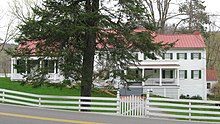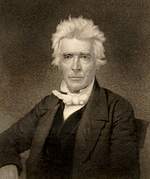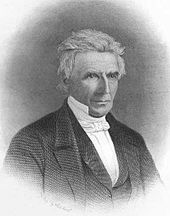Alexander Campbell (theologian)
Alexander Campbell (born September 12, 1788 in Broughshane , Ireland , † March 4, 1866 in Bethany , United States ) was a Scottish - Irish immigrant in America who was ordained a pastor there and together with his father Thomas Campbell a leader of the Reforms that are known as the Restoration Movement . Sometimes this movement is also referred to as the Stone-Campbell Movement . The reform led to the emergence of non- denominational Christian churches in which reference to the Bible is crucial, along with a few other main points.
Campbell was influenced by similar currents in Scotland, particularly James and Robert Haldane , who emphasized a return to original Christianity as portrayed in the New Testament. In 1832 the reformist group allied with a similar movement led by Barton W. Stone in Kentucky. Since then, their congregations have called themselves Disciples of Christ or simply Christian Churches . Several American denominations have their historical roots in this movement, including the Churches of Christ , the Christian churches and churches of Christ , the Evangelical Christian Church in Canada, and the Christian Church (Disciples of Christ) . Alexander Campbell founded Bethany College in Bethany , West Virginia .
biography
youth
Alexander Campbell was born on September 12, 1788 near Ballymena , in the parish of Broughshane , County Antrim , Ireland . Thomas Campbell and Jane Corneigle Campbell, his parents, were from Scotland. Like his father, Campbell was educated at the University of Glasgow , where he was profoundly influenced by the philosophy of the Scottish Enlightenment . In addition, John Locke had a great influence on him. At the age of 21, Alexander Campbell emigrated to the United States with his mother and siblings after his father had emigrated there in 1807. They sailed from Scotland on the Latonia on August 3, 1809, and landed in New York on September 29 , from where they traveled overland to Philadelphia and then turned on to western Pennsylvania . Thomas Campbell was a pastor there in Washington County , then on the border. Alexander Campbell was ordained in his father's Brush Run Church on January 1, 1812 .
Marriages and family life
On March 12, 1811, Campbell had married Margaret Brown. Their father, John Brown, was a landowner in Bethany , then Virginia. The couple lived in what is now called the Alexander Campbell Mansion near Bethany. They had eight children. Their first child, a daughter, was born on March 13, 1812. The birth of his daughter sparked intense preoccupation with baptism at Campbell . Ultimately, he came to the conclusion that the Bible does not support infant baptism , and he came to the realization that people are encouraged to repent and that baptism is not lawful until repentance occurs.
After Margaret's death in 1827, Campbell married Selina Huntington Bakewell on July 31, 1828, with whom he had six children. Alexander Campbell died in Bethany on March 4, 1866. Selina died on June 28, 1897.
Act
From 1815 to 1834 Campbell and his father ran the Brush Run Church in association with a local Baptist association . After disagreement, they joined the Mahoning Baptist Association .
Campbell was a delegate to the 1829 Virginia Constitutional Convention in Richmond . There he met some leading politicians of his time and was invited to preach in churches in the capital.
In 1840 Campbell founded Bethany College in Bethany. He believed that clergymen should be college educated. Many future leaders of the Disciples of Christ and the Churches of Christ graduated from the college, although some of the congregations did not place the same value on the theological degree and professional clergy.
Campbell visited the United Kingdom again in 1847 . During this tour he gave public lectures in England and Scotland. He went to Ireland to bring donations to the US Restoration Movement Churches that they had raised to alleviate the Great Famine in Ireland . In Glasgow he was challenged by James Robertson to a debate on slavery in the United States , which was sponsored by the southern states . After the violent exchange of blows, Robertson sued Campbell for defamation . The American dismissed the charges, but was arrested and jailed for 10 days. Campbell was released when the grounds for his detention were found illegal. The case was ultimately heard, but the jury ruled in Campbell's favor.
Fonts
Already in his 20s Campbell wrote several moral writings under the pseudonym Clarinda . He published it in a local newspaper. In 1820 the text of his debate with the Presbyterian John Walker was published, which convinced him of the effectiveness of publications. He bought a printing press and set up a small publishing house in 1823.
Campbell published two magazines: on the one hand the Christian Baptist from 1823 to 1830, on the other hand the Millennial Harbinger (German: “The Harbinger of the Thousand Year Reich”). He was the editor from 1830 until his death in 1866. During the 1850s, however, its activity in this area declined. In both magazines he advocated a reform of Christianity based on the characteristics practiced on the American border. But he also encouraged writers with dissenting opinions, and the magazines fostered a lively dialogue about reform efforts.
In 1830 Campbell expanded his publishing house for Millennial Harbinger . The change from Christian Baptist to Harbinger was accompanied by various developments. Differences of opinion between Campbell and the Baptists broke out, and in many Baptist associations people related to the Campbell movement were excluded . Campbell was concerned that the name Christian Baptist - which he found less apt than the Biblical name Disciples - might become the de facto name of the group. So he looked for a new name with a more positive connotation and tried to use the magazine to support reforms on the one hand and to point to the Second Coming of Jesus Christ on the other .
Campbell wrote several books (The Christian System) and also some songs (Upon the Banks of Jordan Stood) and compiled a translation of the New Testament under the title The Living Oracles , which he published in 1826. It was based on an 1818 translation by George Campbell, James MacKnight and Philip Doddridge, and included extensive comments by Campbell.
Public discussions
In 1820 he discussed Christian baptism with John Walker, a Baptist, in Mount Pleasant , Ohio , and has been a regular participant in debates ever since. Some of them gained international renown after the minutes were published. In 1823 he discussed infant baptism with William L. McCalla, a Presbyterian ; in April 1829 with Robert Owen on socialism and Christianity ; January 1837 with Archbishop of Cincinnati , John Baptist Purcell , on Protestantism and Catholicism ; in September 1843 he defended the Restoration Movement in a discussion with Nathan L. Rice, who represented traditional Presbyterianism. At times Campbell was tired of debate.
Works (selection)
- The Living Oracles (1826)
- Psalms, Hymns and Spiritual Songs (1828)
- Prospectus of the Millennial Harbinger (1829)
- Delusions: An Analysis of the Book of Mormon (1832)
- The Christian Preacher's Companion (1836)
- The Christian System (1839)
- The Christian Hymnbook (1843)
- A Tract for the People of Kentucky (1849)
- Christian Baptism - Its Antecedents and Consequents (1851)
- The Acts of the Apostles (1858)
- Memoirs of Elder Thomas Campbell (1861)
- Popular Lectures and Addresses (1863)
- Familiar Lectures on the Pentateuch (1867)
Legacy and Awards
- Campbell was a major proponent of the Restoration Movement , which gave rise to many new impulses for Christianity in the United States and non-denominational churches and the Disciples of Christ .
- His Bethany residence, the Alexander Campbell Mansion , has been declared a National Historic Landmark .
Individual evidence
- ↑ a b Lester McAllister, William E Tucker: Journey in Faith. The Bethany Press, St. Louis, Missouri 1975.
- ↑ a b c d e f g h i j k l m n Douglas Allen Foster, Anthony L. Dunnavant: The Encyclopedia of the Stone-Campbell Movement: Christian Church (Disciples of Christ), Christian Churches / Churches of Christ, Churches of Christian. William B. Eerdmans Publishing Co., 2004, ISBN 0-8028-3898-7 , ISBN 978-0-8028-3898-8
- ^ Sydney E. Ahlstrom: A Religious History of the American People. 2004.
- ^ Melton's Encyclopedia of American Religions. 2009.
- ^ A b c Adron Doran: Restoring New Testament Christianity. 21st Century Christian, 1997, ISBN 0-89098-161-2 .
- ^ A b Campbell, Selina Huntington Bakewell. In: Douglas Allen Foster, Anthony L. Dunnavant: The Encyclopedia of the Stone-Campbell Movement: Christian Church (Disciples of Christ), Christian Churches / Churches of Christ, Churches of Christ. Wm. B. Eerdmans Publishing, 2004, ISBN 0-8028-3898-7 , ISBN 978-0-8028-3898-8 , p. 135.
- ↑ Bethany College. In: Douglas Allen Foster, Anthony L. Dunnavant: The Encyclopedia of the Stone-Campbell Movement: Christian Church (Disciples of Christ), Christian Churches / Churches of Christ, Churches of Christ. Wm.B. Eerdmans Publishing, 2004, ISBN 0-8028-3898-7 , ISBN 978-0-8028-3898-8 .
- ↑ a b c d e f g Gary Holloway, "Alexander Campbell as a Publisher", ( Memento of September 3, 2006 in the Internet Archive ) Restoration Quarterly , Vol. 1 (1995)
- ^ Greg Taylor, "Alexander Campbell: Millennial Blogger," ( July 12, 2011 memento on the Internet Archive ), Disciples of Christ Historical Society, June 13, 2011
- ↑ Christian Baptist, The. In: Douglas Allen Foster, Anthony L. Dunnavant: The Encyclopedia of the Stone-Campbell Movement: Christian Church (Disciples of Christ), Christian Churches / Churches of Christ, Churches of Christ. Wm. B. Eerdmans Publishing, 2004, ISBN 0-8028-3898-7 , ISBN 978-0-8028-3898-8 , p. 174.
- ^ Robert Richardson: Memoirs of Alexander Campbell . 2 Vols. Lippincott, Philadelphia 1871. Vol 2, Chapter XXI, Footnote 1
- ↑ a b Bible, Versions and Translations of. In: Douglas Allen Foster, Anthony L. Dunnavant, The Encyclopedia of the Stone-Campbell Movement: Christian Church (Disciples of Christ), Christian Churches / Churches of Christ, Churches of Christ. Wm. B. Eerdmans Publishing, 2004, ISBN 0-8028-3898-7 , ISBN 978-0-8028-3898-8 , pp. 87-88.
- ^ Haley, JJ Debates that made history: the story of Alexander Campbell's debates with Rev. John Walker, Rev. WL McCalla, Mr. Robert Owen, Bishop Purcell and Rev. Nathan L. Rice. Christian Board of Publication, Saint Louis, Missouri 1920.
- ↑ Michael Hines: Campbell's Great Debates . Church History Pages
literature
- James Challen (ed.): Biographical Sketch of Alexander Campbell. In: Ladies' Christian Annual , March 1857 (Volume VI, No. 3), Philadelphia: James Challen. Pages 81–90. Online edition
- J. Caleb Clanton: The Philosophy of Religion of Alexander Campbell . U of Tennessee Press, 2013. [DOI: 10.1080 / 14664658.2014.979000 online review]
- Douglas Foster & al .: The Encyclopedia of the Stone-Campbell Movement . Grand Rapids: Eerdmans, 2005.
- Gary Holloway: "Alexander Campbell as a publisher" , Restoration Quarterly , Vol 37 / No.. 1, 1995.
- Lester McAllister, William E. Tucker: Journey in Faith . St. Louis, Missouri: The Bethany Press, 1975.
- Robert Richardson: Memoirs of Alexander Campbell . 2 vols. Philadelphia: Lippincott, 1871.
Web links
- Campbell texts at the Restoration Movement , Memorial University of Newfoundland
| personal data | |
|---|---|
| SURNAME | Campbell, Alexander |
| ALTERNATIVE NAMES | Clarinda (pseudonym) |
| BRIEF DESCRIPTION | American clergyman and reformer |
| DATE OF BIRTH | September 12, 1788 |
| PLACE OF BIRTH | Ballymena, Ireland |
| DATE OF DEATH | March 4, 1866 |
| Place of death | Bethany, West Virginia |




